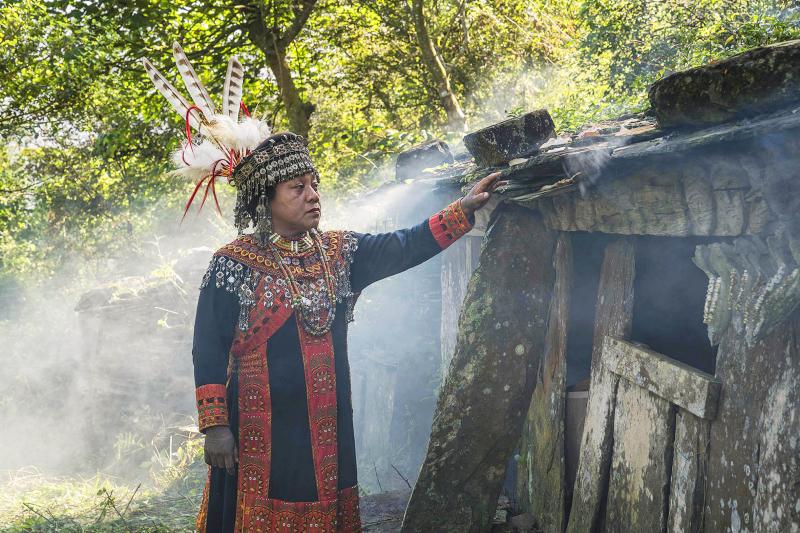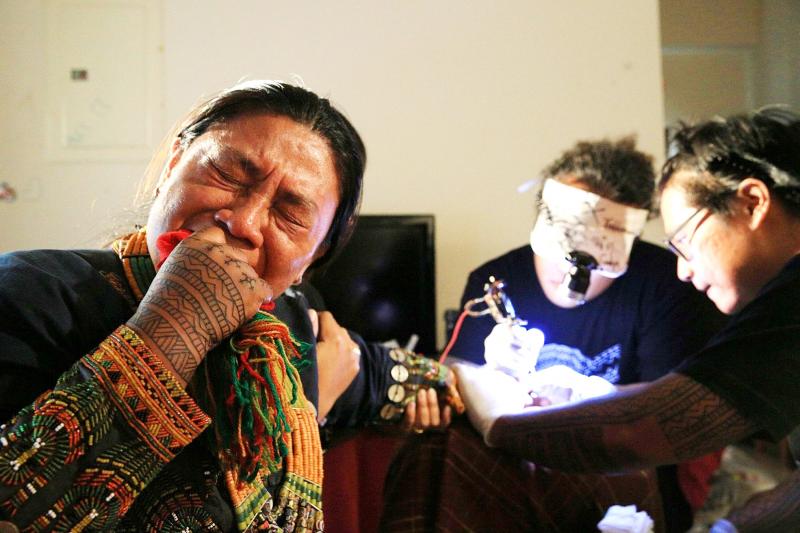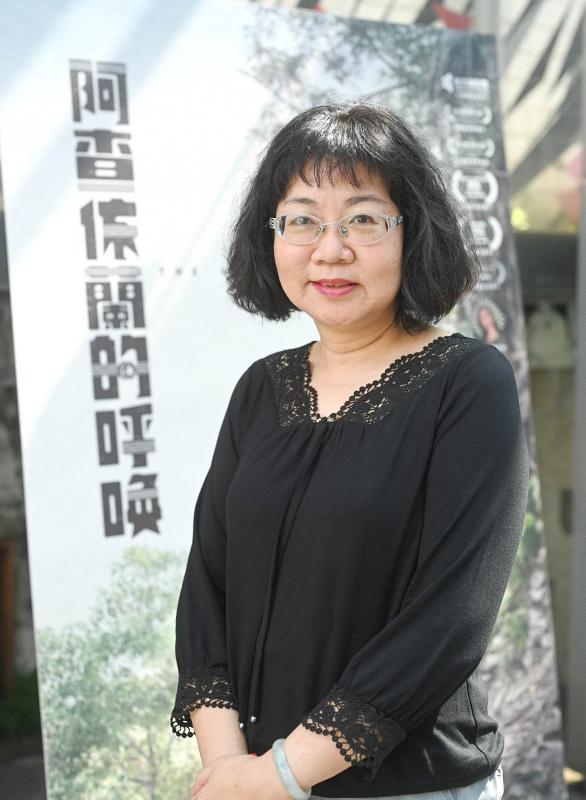Elaine Wei (魏郁蓁) didn’t stop filming when villagers called the police on her or threatened her over the phone. Nor did she shut the project down after her production company ran out of funds to travel to the filming location in Pingtung.
These challenges, and many others, seemed to end after she managed to get The Way Home: The Call of the Azangiljan (阿查依蘭的呼喚, a documentary that depicts the struggles of a Paiwan chief and single mother, into theaters through a crowdfunding campaign and government assistance.
Then, 10 days before opening night, Taipei raised its COVID-19 alert to level 3 and shuttered all movie theaters.

Photo courtesy of Activator Marketing Company
“It is what it is,” Wei says with a laugh during an online interview. “We’ll just have to face it.”
Wei will have to wait until the outbreak is over to negotiate a new screening date for the film, the protagonist for which, Dremedreman Azangiljan, never wanted to be a chief and spent years avoiding it. This, and her lack of knowledge about the Paiwan language and culture caused some in the village to resent her and challenge her title, which became the biggest obstacle to finishing the film.
“I always say that I’m just shooting Dremedreman’s personal story. The film isn’t out to explore who really should be the chief,” Wei says. “Her status is just the setting. What I want to tell is an encouraging story of a woman who is working hard to survive.”

Photo courtesy of Activator Marketing Company
UNEXPECTED CAREER
Wei, who worked most of her life in finance, never planned to be a director either. She was preparing to switch careers when her producer husband Hsu Kuo-yang (徐國揚) decided to launch a documentary studio and asked her to help out.
“I was like, ‘That’s crazy,’” Wei says. “I have a nice job where I’m pretty well-respected.”

Photo courtesy of Activator Marketing Company
But she eventually relented.
“I like learning new things, and I was actually interested in all the topics that were brought up, from ecology to culture to education. It’s very meaningful, and although it doesn’t bring in much money, I found myself unable to say no,” she says.
Wei attempted to go back to work when the production company was in dire financial straits, but she could no longer adjust to the strict environment.
“In the film industry, you can do and say whatever you want,” she says. “I never felt this in the past, but I was unable to express myself at all. That’s when I knew that there was no going back.”
As a former finance department manager, Wei found it difficult to admit that the production company was in debt, but over a decade later, especially with the fundraising and promotion that went into this film, she’s only recently been able to let go and open up.
The couple met Dremedreman while working on a project about the Austronesian peoples, which include all of Taiwan’s Aborigines. Wei found it intriguing that the Paiwan still have a class system — and that there was a female chief who couldn’t really speak Paiwan.
“Not only that, she’s a single mother with three children and she has a very lively personality,” Wei says. “She loves telling jokes. And she doesn’t hide her emotions at all. Someone like that is rare find for a documentary filmmaker.”
PORTRAYING CLASS AND CONFLICT
The Paiwan class system is hereditary, and as the oldest child, Dremedreman is first in line as chief. But due to her good grades, she left the village of Tjuwaqau at a young age and eventually became a nurse. When she turned 30, her father suddenly died. And then her husband asked for a divorce. She returned to her home village to start over, but life wasn’t that easy as not all the villagers were accepting of her, especially when she often had to leave to find work to support her children.
An argument between Dremedreman and an older relative broke out at a wedding during the early stages of filming, and after finding out the reason, Wei attempted to interview the ones who were opposed to Dremedreman’s status.
“They not only refused, they called the cops on us,” she says.
Wei and Hsu usually hired directors to helm their productions, but following this incident, they decided it was better to weather the risks themselves. They also thought that as a woman, Wei would be able to get closer to Dremedreman, and Wei was thrust into her first directing role.
Wei says a major dilemma was how much of the conflict to put in the film. She realized that she couldn’t tell a complete story without mentioning the dispute, but limited it to scenes that help explain Dremedreman’s story.
“For example, I include a scene where Dremedreman’s aunt was yelling at her for missing her daughter’s wedding,” Wei says. “That helps explain how desperate she was to escape the responsibility when she was younger.”
There’s a scene in the movie where the crew goes into the mountains with Dremedreman to look for hundred-pace vipers, and end up witnessing her speaking to her ancestral spirits. Wei says she had a supernatural experience then: suddenly, the colors of the hills changed and all the people around her had disappeared. The same thing happened again when they approached the ancestral spirit house in the old village.
Wei says as outsiders, it’s impossible to portray the complex Paiwan culture in one movie. They were fortunate enough to capture a colorful 10-day wedding, but the focus is still on the characters, events and storytelling.
“I see the wedding as a tiny, cursory introduction to Paiwan culture,” she says.

Towering high above Taiwan’s capital city at 508 meters, Taipei 101 dominates the skyline. The earthquake-proof skyscraper of steel and glass has captured the imagination of professional rock climber Alex Honnold for more than a decade. Tomorrow morning, he will climb it in his signature free solo style — without ropes or protective equipment. And Netflix will broadcast it — live. The event’s announcement has drawn both excitement and trepidation, as well as some concerns over the ethical implications of attempting such a high-risk endeavor on live broadcast. Many have questioned Honnold’s desire to continues his free-solo climbs now that he’s a

As Taiwan’s second most populous city, Taichung looms large in the electoral map. Taiwanese political commentators describe it — along with neighboring Changhua County — as Taiwan’s “swing states” (搖擺州), which is a curious direct borrowing from American election terminology. In the early post-Martial Law era, Taichung was referred to as a “desert of democracy” because while the Democratic Progressive Party (DPP) was winning elections in the north and south, Taichung remained staunchly loyal to the Chinese Nationalist Party (KMT). That changed over time, but in both Changhua and Taichung, the DPP still suffers from a “one-term curse,” with the

Lines between cop and criminal get murky in Joe Carnahan’s The Rip, a crime thriller set across one foggy Miami night, starring Matt Damon and Ben Affleck. Damon and Affleck, of course, are so closely associated with Boston — most recently they produced the 2024 heist movie The Instigators there — that a detour to South Florida puts them, a little awkwardly, in an entirely different movie landscape. This is Miami Vice territory or Elmore Leonard Land, not Southie or The Town. In The Rip, they play Miami narcotics officers who come upon a cartel stash house that Lt. Dane Dumars (Damon)

Today Taiwanese accept as legitimate government control of many aspects of land use. That legitimacy hides in plain sight the way the system of authoritarian land grabs that favored big firms in the developmentalist era has given way to a government land grab system that favors big developers in the modern democratic era. Articles 142 and 143 of the Republic of China (ROC) Constitution form the basis of that control. They incorporate the thinking of Sun Yat-sen (孫逸仙) in considering the problems of land in China. Article 143 states: “All land within the territory of the Republic of China shall